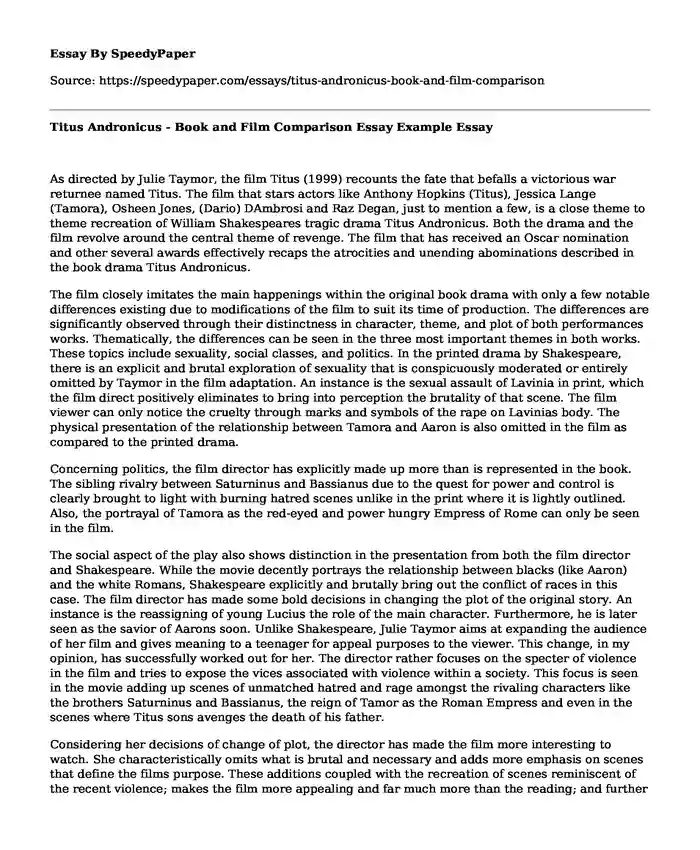
| Type of paper: | Essay |
| Categories: | Literature Movie Shakespeare |
| Pages: | 3 |
| Wordcount: | 629 words |
As directed by Julie Taymor, the film Titus (1999) recounts the fate that befalls a victorious war returnee named Titus. The film that stars actors like Anthony Hopkins (Titus), Jessica Lange (Tamora), Osheen Jones, (Dario) DAmbrosi and Raz Degan, just to mention a few, is a close theme to theme recreation of William Shakespeares tragic drama Titus Andronicus. Both the drama and the film revolve around the central theme of revenge. The film that has received an Oscar nomination and other several awards effectively recaps the atrocities and unending abominations described in the book drama Titus Andronicus.
The film closely imitates the main happenings within the original book drama with only a few notable differences existing due to modifications of the film to suit its time of production. The differences are significantly observed through their distinctness in character, theme, and plot of both performances works. Thematically, the differences can be seen in the three most important themes in both works. These topics include sexuality, social classes, and politics. In the printed drama by Shakespeare, there is an explicit and brutal exploration of sexuality that is conspicuously moderated or entirely omitted by Taymor in the film adaptation. An instance is the sexual assault of Lavinia in print, which the film direct positively eliminates to bring into perception the brutality of that scene. The film viewer can only notice the cruelty through marks and symbols of the rape on Lavinias body. The physical presentation of the relationship between Tamora and Aaron is also omitted in the film as compared to the printed drama.
Concerning politics, the film director has explicitly made up more than is represented in the book. The sibling rivalry between Saturninus and Bassianus due to the quest for power and control is clearly brought to light with burning hatred scenes unlike in the print where it is lightly outlined. Also, the portrayal of Tamora as the red-eyed and power hungry Empress of Rome can only be seen in the film.
The social aspect of the play also shows distinction in the presentation from both the film director and Shakespeare. While the movie decently portrays the relationship between blacks (like Aaron) and the white Romans, Shakespeare explicitly and brutally bring out the conflict of races in this case. The film director has made some bold decisions in changing the plot of the original story. An instance is the reassigning of young Lucius the role of the main character. Furthermore, he is later seen as the savior of Aarons soon. Unlike Shakespeare, Julie Taymor aims at expanding the audience of her film and gives meaning to a teenager for appeal purposes to the viewer. This change, in my opinion, has successfully worked out for her. The director rather focuses on the specter of violence in the film and tries to expose the vices associated with violence within a society. This focus is seen in the movie adding up scenes of unmatched hatred and rage amongst the rivaling characters like the brothers Saturninus and Bassianus, the reign of Tamor as the Roman Empress and even in the scenes where Titus sons avenges the death of his father.
Considering her decisions of change of plot, the director has made the film more interesting to watch. She characteristically omits what is brutal and necessary and adds more emphasis on scenes that define the films purpose. These additions coupled with the recreation of scenes reminiscent of the recent violence; makes the film more appealing and far much more than the reading; and further enhances the understanding of a rather complex Shakespearean work in Titus Andronicus. The film makes the printed play more successful by revealing its timeless relevance to the modern society that has major issues mostly revolving around sexuality, social classes, and politics.
Cite this page
Titus Andronicus - Book and Film Comparison Essay Example. (2019, Nov 25). Retrieved from https://speedypaper.net/essays/titus-andronicus-book-and-film-comparison
Request Removal
If you are the original author of this essay and no longer wish to have it published on the SpeedyPaper website, please click below to request its removal:
- Essay Sample on Communication Barriers Between Nigerians and Chinese
- The Greening of a Pulp and Paper Mill - Case Study Paper for Free
- Clifford's Panpsychism Essay Example
- HRM Essay Example: Develop a Supporting Human Resource Plan
- Paper Example: Lessons Learnt From the Challenger Disaster
- The Decision of Swedish Municipalities Compile a Voluntary Sustainability Report - Paper Example
- Literary Analysis Essay: My Country and My People by Lin Yutang
Popular categories




